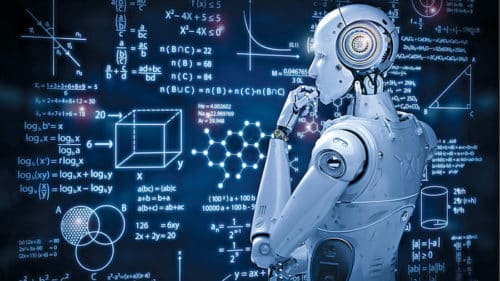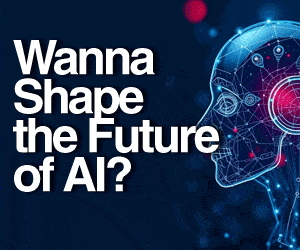Artificial intelligence (AI) has been playing an important role in every field, including the education sector. AI-based platforms have helped students and teachers in getting a better learning experience. Most students find these quite interesting, exciting, and engaging. This article covers some common AI-based solutions in education and advantages of AI in the Indian education system.
Passing the English language test by a machine demonstrates the success and power of artificial intelligence (AI). When a machine learns things through machine learning (ML) algorithms and gives correct results, it is remarkable. As per a report from newscientist.com, an AI passed the English language test and achieved its best-ever scores. The result was a breakthrough and an interesting development in AI technology.
Another breakthrough was the AI-based program AlphaGo defeating humans in the complex board game Go held in South Korea in 2016. AlphaGo makes its moves based on knowledge previously learned through ML techniques.
AI has been playing an important role in every field, including the education sector. There are so many interesting things happening around AI technology in the education industry. This includes AI-based online classes, enabling personalised learning, helping students get better scores, etc. But what about teachers? What benefits do teachers get from AI technology? Will AI replace teachers in the near future? Before answering all these questions, let’s first go through some facts about AI and its implications in the education industry.
This article covers some common AI-based solutions in education, use cases of AI-based learning platforms, and advantages of AI in the Indian education system.

AI-based solutions in education
There are many AI-based solutions available in the education field. There are great solutions available for school and college students. AI-based applications can analyse enormous amount of information and offer various options for students, including personalised learning materials.
Personalised learning
This is among the most important applications of AI that allows focusing on the individual needs of the student. There are firms like Dale Carnegie Training that offer many personalised courses. Through the use of AI technology, it is possible to create individual instructions, testing, and feedback.
Voice assistants
Some AI-based voice assistants available in the market include Amazon Alexa, Apple Siri, and Google Home. These gadgets are already in use for teaching and learning. Students can interact with these gadgets and get help without a human teacher. Since such AI-based assistants are new, most students find these quite interesting, exciting, and more engaging.
Smart content
This includes various learning materials, such as digitised textbooks, personalised contents, and customised interfaces.
Global learning
With AI technology, students can study various courses and get training programmes available in different parts of the world by sitting at home. There are many platforms with interactive learning materials available from the best tutors across the globe. AI also provides opportunities for students who speak different languages or have visual or hearing problems. There is an AI-based translator solution that creates subtitles in real-time mode. Using AI-based speech recognition, students can listen in their native languages.
Online classroom
Due to the outbreak of coronavirus, online classes have become popular than ever across the globe. A lot of companies have launched online classroom apps where students and teachers can interact through live video streaming, screen sharing, media-interactive presentations, etc. The most common online classroom apps used in schools include Zoom, Microsoft Teams, and Google Meet. Zoom has rolled out AI-powered transcripts, note-taking features, facial recognition, and more. Microsoft Teams is another videoconferencing app with a rich set of AI-enabled capabilities. Google Meet is a popular app with AI-based noise cancellation for video calls.
Eyeball tracker
This tool tracks learners’ eye gaze and provides real-time feedback on their gaze patterns during lectures. The main goal is to investigate the attention patterns of students in the classroom and create a better understanding of their interests. It also aims to generate new insights into effective teaching techniques and keep students engaged during lectures.
Emotion recognition
Some schools have equipped several classrooms with cameras to recognise emotions of students. The systems automatically take attendance and track the activities of students, including reading, writing, or listening. Emotion recognition uses images rather than text as inputs. The images could be static photos of students’ faces taken in real time. Using the system, the school can observe the behaviour of each student and take actions accordingly.
Virtual reality (VR)
VR with AI provides outstanding visualisations that are not possible in traditional classrooms. The VR system uses immersive 3D visualisation technology to improve education and experiences. For example, when a student uses VR to understand the human heart, he/she will be able to visualise the whole system, including internal elements, pumping of blood back and forth inside the heart, and other functions. It helps in a better understanding of the concept.

AI-based learning platforms
There are many AI-based learning platforms already available across the globe. Some features of these platforms include the ability to analyse the knowledge level of a learner, offer backward communication, provide a plan for improvements, among others.
Beable. It is an integrated system launched by Achieve3000. It is a remote learning solution for middle school and high school in the US. It combines with data science, automation, and AI to deliver a tailored and multi-dimensional solution for students.
Little Dragon. It employs behavioural and emotional aspects of learning. An emotional AI detects states like boredom and frustration and then adjusts content to optimise the experience of learning.
Brainly. It is an AI-based solution offering personalised materials. It is basically a social learning community to help students. They can discuss issues related to their homework or gain new knowledge from other students. This platform utilises ML to provide a better user experience and assists in identifying spam and inappropriate content.
Carnegie Learning. It is also an online learning platform for middle and high school students. This system tends to provide more customised education materials, making the learning process more comfortable. It offers real-time education, analyses users’ keystrokes, and allows the tutor to see students’ progress.
Third Space Learning. AI is used to monitor lessons each week, pair students with their ideal lesson, and pay attention to tutors and the way they teach lessons. The system can recommend ways to improve teaching techniques. For example, if the teacher speaks too fast or too slow, the system sends a notification.
Advantages for students
Learn at any time. Many AI-based apps for learning are available online. These apps enable students to learn lessons on the go or study in their free time. Moreover, students can get feedback from tutors in real-time mode.
Flexible options. AI-based solutions are available depending on students’ level of knowledge, topics, and choices. For example, the system lets students take an initial test before using the app. The app analyses the test result and provides suitable tasks and courses.
Virtual mentors. AI-based platforms offer virtual mentors to track students’ progress. It’s good to get instant feedback from the virtual tutor before human teachers can evaluate the actual progress.
Advantages for teachers
Quick assessment. Different AI-based online courses allow teachers to quickly assess a student’s knowledge. For example, if most of the students gave wrong answers to a particular question in an online test, the teacher can pay more attention to that particular topic.
Better engagement. Teachers often find it difficult to create a productive engagement within the class. Many modern technologies such as VR classrooms help students to get involved in the education process, making them more interactive. With VR technology, students become more engaged, talk about their experiences, and feel more motivated to learn. It also helps teachers to keep their students engaged in the courses.
Personalisation. Various AI-enabled algorithms can analyse students’ interests and provide more personalised recommendations and training programmes.
AI in Indian education space
The government has set up a task force to boost the AI sector, including AI in education and research industries. The National Association of Software and Services Companies (Nasscom), in collaboration with government’s Niti Aayog, has launched an AI-based module for students of Indian schools.
India’s Central Board of Secondary Education (CBSE) has recently introduced two handbooks for teachers to help integrate AI in schools. The first is about AI curriculum and experimental methodologies covering both social and technological skills. The second is about AI integration across subjects to enhance the multidisciplinary approach in the teaching-learning process. This handbook discusses how AI-based tools can enhance learning within and outside classrooms.
Many Indian institutes are utilising AI to enhance their learning processes and provide quality education to students. Apart from homegrown video-conferencing apps such as JioMeet and Say Namaste, there are many AI-based learning platforms launched by Indian startups. Some of the use cases launched by Indian companies are:
Thinkster Maths. It is an AI-based math learning platform that combines a world-class curriculum with personalisation. The system tracks and visualises how a student is thinking while he or she works on a problem. This helps teachers to quickly spot problem areas of the student. It was founded by alumni from IIT and BITS.
BYJU’S. It is one of the popular online classes in India, providing educational content mainly to school students from classes one to twelve. It employs AI, ML, computer vision, cloud-based analytics, as well as augmented and virtual reality. BYJU’S features include personalised and interactive learning and in-depth analysis. It was founded in 2011 by Byju Raveendran.
VideoKen. It is an AI-based platform that makes informational videos richer, consumable, and engaging. It works on cutting edge technologies involving Big Data analytics, AI, and ML. It offers an online video-based social learning platform. Users can search and curate educational video content based on the required topic, quickly search the part of the video they require based on phrases, store them as a private note, and share it with others. It was founded in January 2016 by Manish Gupta.
Utter. It is a chatbot-based application available on an Android device for learning English. The product is offered for businesses and individuals. It allows users to learn English with the help of chatbots or tutors. The platform was launched in August 2017 by Ninad Vengurlekar and Amit Bhadbhade.
Speedlabs. It is AI-based online learning and practicing platform. Speedlabs uses AI and ML technologies to provide customised and highly engaging practice platform and learning resources. It was founded by IIT and IIM alumni.
Is AI replacing teachers?
With so many new AI-based technologies around and a plethora of learning platforms available online, students have so many flexible options available for them. But the question is, what about teachers? Is AI a doom or a blessing for teachers? What benefits do teachers get from AI technology? Some people may even ask—do we really need traditional teachers in classrooms in future?
It’s true that AI technology brings a lot of benefits to various fields, including education. Many researchers claim that AI and ML can increase the level of education. The latest innovations allow developers to teach a computer to do complicated tasks. It lends the opportunity to improve learning processes. Researchers have been able to make robots and AI-based solutions to teach humans in a limited way. But replacing a human teacher or professor by an AI-robot or AI-based solution is impossible. AI provides many benefits not only to students but teachers as well.
AI technology assists teachers to perform better, improves the teaching process, and reduces the burden of teachers, which, in turn, improves the students’ learning curves and experiences.








